AWM41 1018 - [Nurses Narratives] Sister E J Nobbs
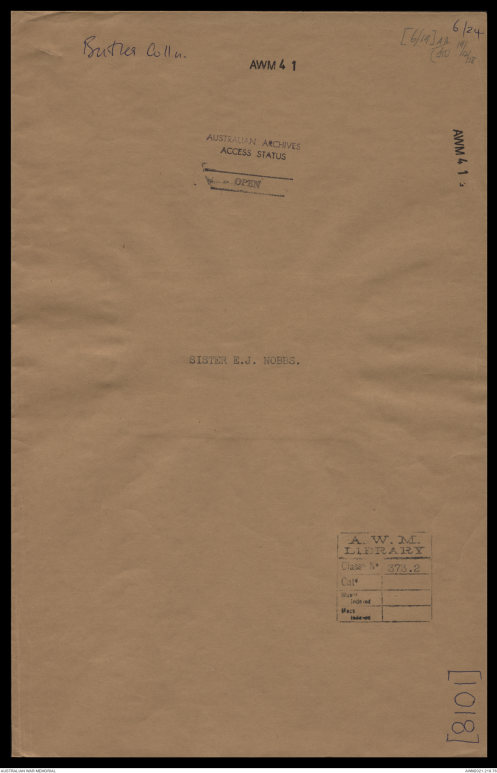
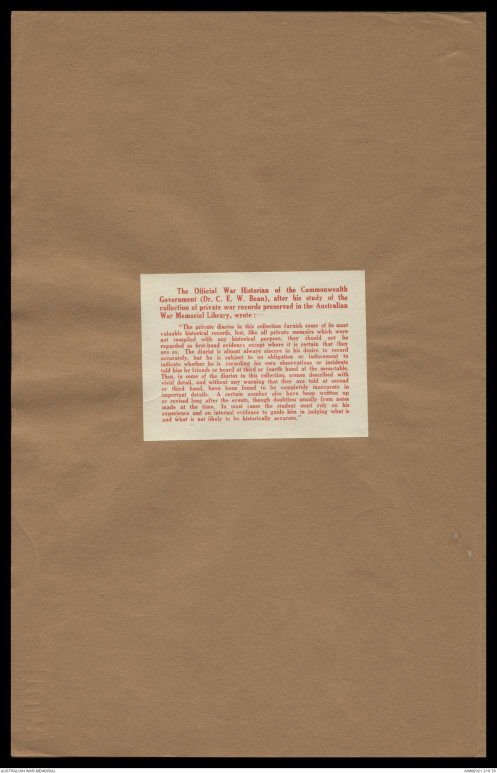
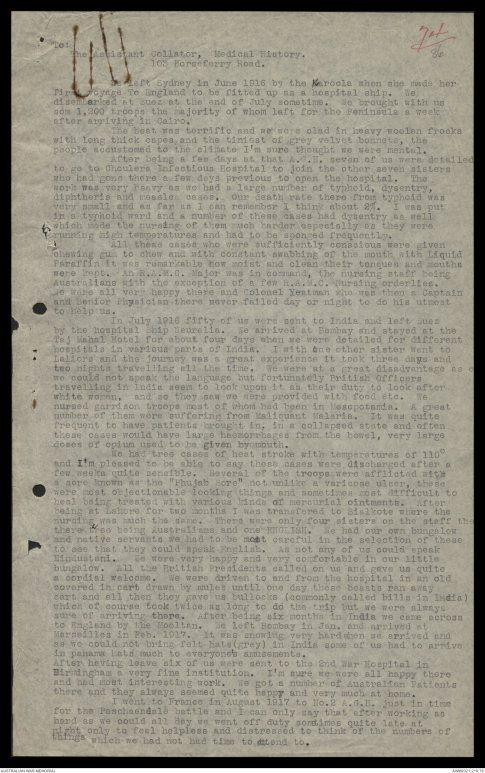
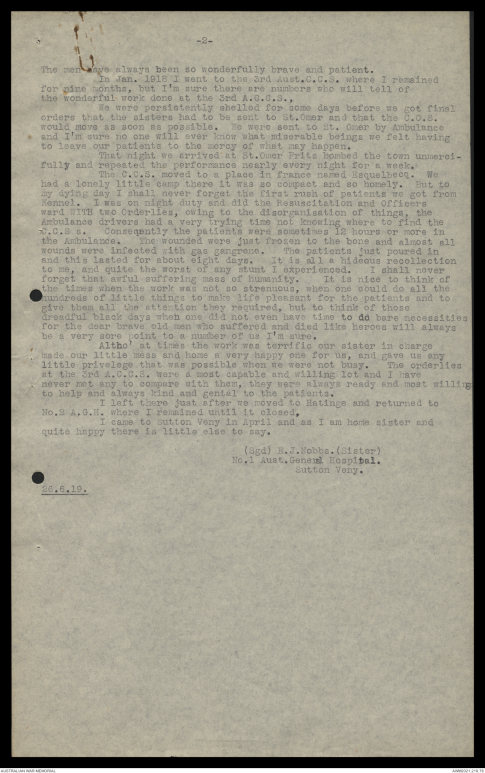
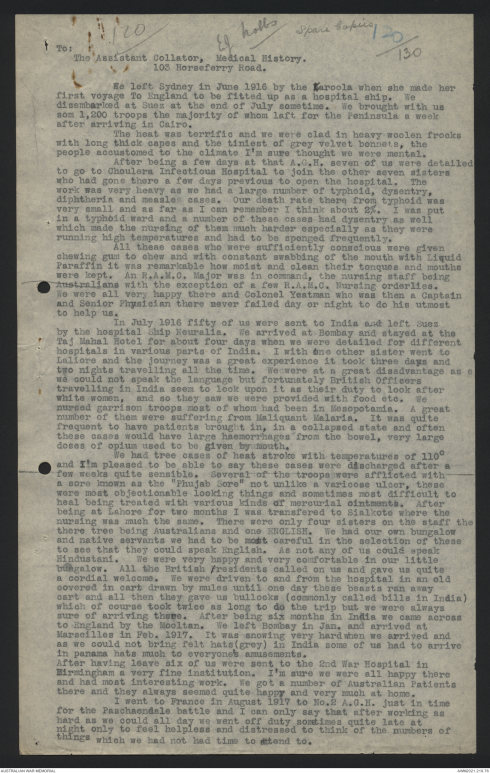
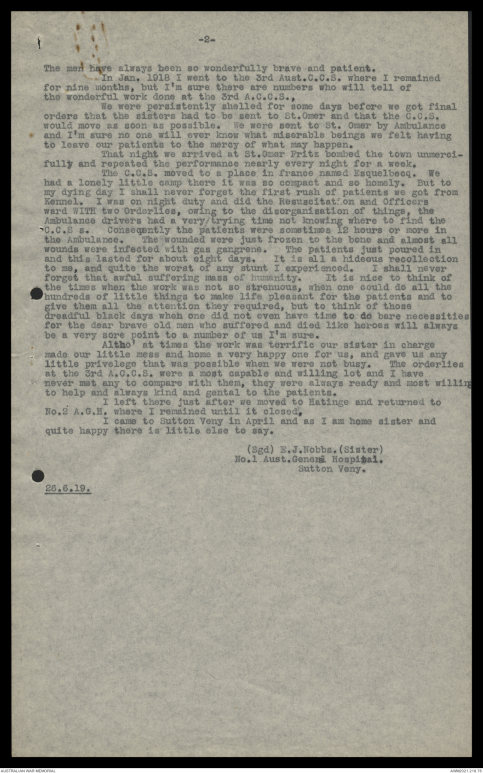
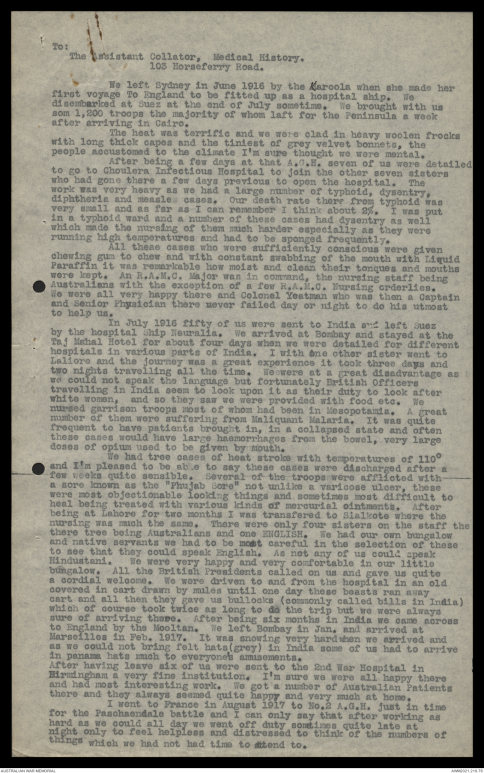
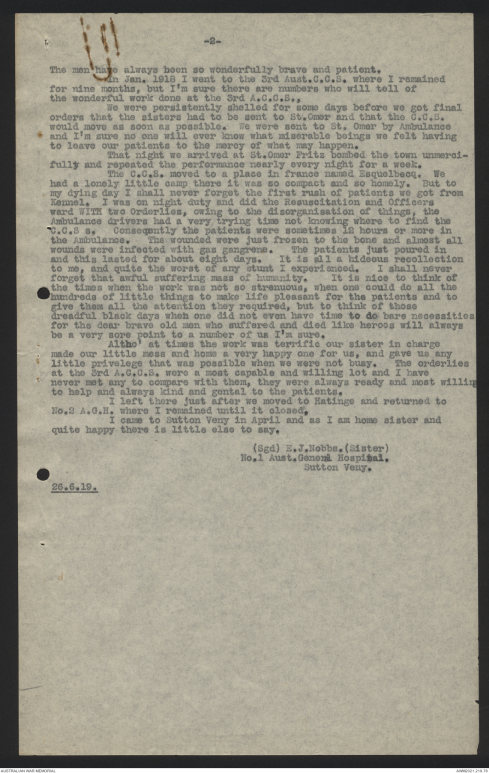
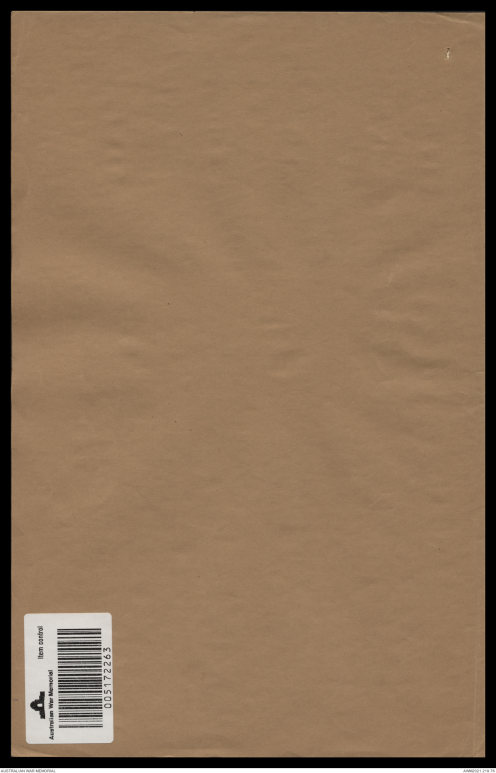
Butler Colln
[6/19]
AA
19/12/18
6/24
AWM 4.1
Australian Archive Access Status
OPEN
SISTER E.J. NOBBS.
A.W.M. LIBRARY 373.2
[1018]
[*AWM 41*]
The Official War Histories of the Commonwealth
Government (Dr. C. E. W. Bean), after his study of the
collections of private war records preserved in the Australian
War Memorial Library, wrote:-
"The private diaries in this collection furnish some of its most
valuable historical records, but, like all private souvenirs which were
not compiled with any historical purpose they should not be
regarded as first-hand evidence except where it is certain that they
are so. The diarist is almost always sincere in his desire to record
accurately, but for a subject to no obligation or inforcement to
indicate whether he is recording his own observations or incidents
told him by friends, or heard as third or fourth hand at the mess-table.
Thus, in some of the diaries in this collection, events described with
vivid detail, and without any warning that they are told as second
or third hand, have been found to be completely inaccurate in
important details. A certain number also have been written up
or recorded long after the events, though doubtless usually from notes
made at the time. In most cases the student must rely on his
experiences and an internal evidence to guide him in judging what is
and what is not likely to be historically accurate."
74/86
To:
The Assistant Collator, Medical History.
103 Horseferry Road.
We left Sydney in June 1916 by the Karoola when she made her
first voyage To England to be fitted up as a hospital ship. We
disembarked at Suez at the end of July sometime. We brought with us
som 1,200 troops the majority of whom left for the Peninsula a week
after arriving in Cairo.
The heat was terrific and we were clad in heavy woolen frocks
with long thick capes and the tiniest of grey velvet bonnets, the
people accustomed to the cimate I'm sure thought we were mental.
After being a few days at that A.G.H. seven of us were detailed
to go the Choulera Infectious Hospital to join the other seven sisters
who had gone there a few days previous to open the hospital. The
work was very heavy as we had a large number of typhoid, dysentry,
diphtheria and measle cases. Our death rate there from typhoid was
very small and as far as I can remember I think about 2%. I was put
in a typhoid ward and a number of these cases had dysentry as well
which made the nursing of them much harder especially as they were
running high temperatures and had to be sponged frequently.
All those cases who were sufficiently conscious were given
chewing gum to chew and with constant swabbing of the mouth with Liquid
Paraffin it was remarkable how moist and clean their tongues and mouths
were kept. An R.A.M.C. Major was in command, the nursing staff being
Australians with the exception of a few R.A.M.C. Nursing orderlies.
We were all very happy there and Colonel Yeatman who was then a Captain
and Senior Physician there never failed day or night to do his utmost
to help us.
In July 1916 fifty of us were sent to India and left Suez
by the hospital ship Neuralia. We arrived at Bombay and stayed at the
Taj Mahal Hotel for about four days when we were detailed for different
hospitals in various parts of India. I with one other sister went to
Lahore and the journey was a great experience it took three days and
two nights travelling all the time. We were at a great disadvantage as
we could not speak the language but fortunately British Officers
travelling in India seem to look upon it as their duty to look after
white women, and so they saw we were provided with food etc. We
nursed garrison troops most of whom had been in Mesopotamia. A great
number of them were suffering from Maliquant Malaria. It was quite
frequent to have patients brought in, in a collapsed state and often
these cases would have large haemorrhages from the bowel, very large
doses of opium used to be given by mouth.
We had tree cases of heat stroke with temperatures of 110°
and I'm pleased to be able to say those cases were discharged after a
few weeks quite sensible. Several of the troops were troops were afflicted with
a sore known as the "Punjab Sore" not unlike a varicose ulcer, these
were most objectionable looking things and sometimes most difficult to
heal being treated with various kinds of mercurial ointments. After
being at Lahore for two months I was transfered to Sialkote where the
nursing was much the same. There were only four sisters on the staff the
there three being Australian and one ENGLISH. We had our own bungalow
and native servants we had to be most careful in the selection of these
to see that they could speak English. As not any of us could speak
Hindustani. We were very happy and very comfortable in our little
bungalow. All the British Residents called on us and gave us quite
a cordial welcome. We were driven to and from the hospital in an old
covered cart drawn by mules until one day these beasts ran away
cart and all then they gave us bullocks (commonly called bills in India)
which of course took twice as long to do the trip but we were always
sure of arriving there. After being six months in India we came across
to England by the Mooltan. We left Bombay in Jan. and arrived at
Marseilles in Feb. 1917. It was snowing very hard when we arrived and
as we could not bring felt hats (grey) in India some of us had to arrive
in panama hats much to everyone's amusements.
After having leaving six of us were sent to the 2nd War Hospital in
Birmingham a very fine institution. I'm sure we were all happy there
and had most interesting work. We go a number of Australian Patients
there and they always seemed quite happy and very much at home.
I went to France in August 1917 to No.2 A.G.H. just in time
for the Paschaendale battle and I can only say that after working as
hard as we could all day and sent off duty sometimes quite late at
night only to feel helpless and distressed to think of the numbers of
thing which we had not had time to attend to.
-2-
The men have always been so wonderfully brave and patient.
In Jan. 1918 I went to the 3rd Aust.C.C.S. where I remained
for nine months, but I'm sure there are numbers who will tell of
the wonderful work done at the 3rd A.C.C.S.,
We were persistently shelled for some days before we got final
orders that the sisters had to be sent to St. Omer and that the C.C.S.
would move as soon as possible. We were sent to St. Omer by Ambulance
and I'm sure no one will every know what miserable beings we felt having
to leave our patients to the mercy of what may happen.
That night we arrived at St. Omer Brits bombed the town unmerci-
fully and repeated the performance nearly every night for a week.
The C.C.S. moved to a place in france named Requelbecq. We
had a lonely little camp there it was so compact and so homely. But to
my dying day I shall never forget the first rush of patients we got from
Kennel. I was on night duty and did the Resuscitation and Officers
ward WITH two Orderlies, owing to the disorganisation of things, the
Ambulance drivers had a very trying time not knowing where to find the
C.C.S s. Consequently the patients were sometimes 12 hours or more in
the Ambulance. The wounded were just frozen to the bone and almost all
wounds were infected with gas gangrene. The patients just poured in
and this lasted for about eight days. It is all a hideous recollection
to me, and quite the worst of any stunt I experienced. I shall never
forget that awful suffering mass of humanity. It is nice to think of
the times when the work was not so strennous, when one could do all the
hundreds of little things to make life pleasant for the patients and to
given them all the attention they required, but to think of those
dreadful black days when one did not even hve time to do bare necessities
for the dear brave old men who suffered and died like heroes will always
be a very sore point to a number of us I'm sure.
Altho' at times the work was terrific our sister in charge
made out little mess and home a very happy one for us, and gave us any
little privelege that was possible when we were not busy. The orderlies
at the 3rd A.C.C.S. were a most capable and willing lot and I have
never met any to compare with them, they were always ready and most willing
to help and always kind and gentel to the patients.
I left there just after we moved to Hatinge and returned to
No.2 A.G.H. where I remained until it closed.
I came to Sutton Veny in April and as I am home sister and
quite happy there is little else to say.
(Sgd) E.J.Nobbs. (Sister)
No.1 Aust.General Hospital.
Sutton Veny.
26.6.19.
[120]
EJ Nobbs Spare Copies
120/130
To:
The Assistant Collator, Medical History.
103 Horseferry Road.
We left Sydney in June 1916 by the Karoola when she made her
first voyage To England to be fitted up as a hospital ship. We
disembarked at Suez at the end of July sometime. We brought with us
som 1,200 troops the majority of whom left for the Peninsula a week
after arriving in Cairo.
The heat was terrific and we were clad in heavy woolan frocks
with long thick capes and the tiniest of grey velvet bonnets, the
people accustomed to the climate I'm sure thought we were mental.
After being a few days at that A.G.H. seven of us were detailed
to go the Choulera Infectious Hospital to join the other seven sisters
who had gone there a few days previous to open the hospital. The
work was very heavy as we had a large number of typhoid, dysentry,
diphtheria and measle cases. Our death rate there from typhoid was
very small and as far as I can remember I think about 2%. I was put
in a typhoid ward and a number of these cases had dysentry as well
which made the nursing of them much harder especially as they were
running high temperatures and had to be sponged frequently.
All those cases who were sufficiently conscious were given
chewing gum to chew and with constant swabbing of the mouth with Liquid
Paraffin it was remarkable how moist and clean their tongues and mouths
were kept. An R.A.M.C. Major was in command, the nursing staff being
Australians with the exception of a few R.A.M.C. Nursing orderlies.
We were all very happy there and Colonel Yeatman who was then a Captain
and Senior Physician there never failed day or night to do his utmost
to help us.
In July 1916 fifty of us were sent to India and left Suez
by the hospital ship Neuralia. We arrived at Bombay and stayed at the
Taj Mahal Hotel for about four days when we were detailed for different
hospitals in various parts of India. I with one other sister went to
Lahore and the journey was a great experience it took three days and
two nights travelling all the time. We were at a great disadvantage as
we could not speak the language but fortunately British Officers
travelling in India seem to look upon it as their duty to look after
white women, and so they saw we were provided with food etc. We
nursed garrison troops most of whom had been in Mesopotamia. A great
number of them were suffering from Maliquant Malaria. It was quite
frequent to have patients brought in, in a collapsed state and often
these cases would have large haemorrhages from the bowel, very large
doses of opium used to be given by mouth.
We had tree cases of heat stroke with temperatures of 110°
and I'm pleased to be able to say those cases were discharged after a
few weeks quite sensible. Several of the troops were troops were afflicted with
a sore known as the "Punjab Sore" not unlike a varicose ulcer, these
were most objectionable looking things and sometimes most difficult to
heal being treated with various kinds of mercurial ointments. After
being at Lahore for two months I was transfered to Sialkote where the
nursing was much the same. There were only four sisters on the staff the
there three being Australian and one ENGLISH. We had our own bungalow
and native servants we had to be most careful in the selection of these
to see that they could speak English. As not any of us could speak
Hindustani. We were very happy and very comfortable in our little
bungalow. All the British Residents called on us and gave us quite
a cordial welcome. We were driven to and from the hospital in an old
covered cart drawn by mules until one day these beasts ran away
cart and all then they gave us bullocks (commonly called bills in India)
which of course took twice as long to do the trip but we were always
sure of arriving there. After being six months in India we came across
to England by the Mooltan. We left Bombay in Jan. and arrived at
Marseilles in Feb. 1917. It was snowing very hard when we arrived and
as we could not bring felt hats (grey) in India some of us had to arrive
in panama hats much to everyone's amusements.
After having leaving six of us were sent to the 2nd War Hospital in
Birmingham a very fine institution. I'm sure we were all happy there
and had most interesting work. We go a number of Australian Patients
there and they always seemed quite happy and very much at home.
I went to France in August 1917 to No.2 A.G.H. just in time
for the Paschaendale battle and I can only say that after working as
hard as we could all day and sent off duty sometimes quite late at
night only to feel helpless and distressed to think of the numbers of
thing which we had not had time to attend to.
-2-
The men have always been so wonderfully brave and patient.
In Jan. 1918 I went to the 3rd Aust.C.C.S. where I remained
for nine months, but I'm sure there are numbers who will tell of
the wonderful work done at the 3rd A.C.C.S.,
We were persistently shelled for some days before we got final
orders that the sisters had to be sent to St. Omer and that the C.C.S.
would move as soon as possible. We were sent to St. Omer by Ambulance
and I'm sure no one will every know what miserable beings we felt having
to leave our patients to the mercy of what may happen.
That night we arrived at St. Omer Brits bombed the town unmerci-
fully and repeated the performance nearly every night for a week.
The C.C.S. moved to a place in france named Requelbecq. We
had a lonely little camp there it was so compact and so homely. But to
my dying day I shall never forget the first rush of patients we got from
Kennel. I was on night duty and did the Resuscitation and Officers
ward WITH two Orderlies, owing to the disorganisation of things, the
Ambulance drivers had a very trying time not knowing where to find the
C.C.S s. Consequently the patients were sometimes 12 hours or more in
the Ambulance. The wounded were just frozen to the bone and almost all
wounds were infected with gas gangrene. The patients just poured in
and this lasted for about eight days. It is all a hideous recollection
to me, and quite the worst of any stunt I experienced. I shall never
forget that awful suffering mass of humanity. It is nice to think of
the times when the work was not so strennous, when one could do all the
hundreds of little things to make life pleasant for the patients and to
given them all the attention they required, but to think of those
dreadful black days when one did not even hve time to do bare necessities
for the dear brave old men who suffered and died like heroes will always
be a very sore point to a number of us I'm sure.
Altho' at times the work was terrific our sister in charge
made out little mess and home a very happy one for us, and gave us any
little privelege that was possible when we were not busy. The orderlies
at the 3rd A.C.C.S. were a most capable and willing lot and I have
never met any to compare with them, they were always ready and most willing
to help and always kind and gentel to the patients.
I left there just after we moved to Hatinge and returned to
No.2 A.G.H. where I remained until it closed.
I came to Sutton Veny in April and as I am home sister and
quite happy there is little else to say.
(Sgd) E.J.Nobbs. (Sister)
No.1 Aust.General Hospital.
Sutton Veny.
26.6.19.
To:
The Assistant Collator, Medical History.
103 Horseferry Road.
We left Sydney in June 1916 by the Karoola when she made her
first voyage To England to be fitted up as a hospital ship. We
disembarked at Suez at the end of July sometime. We brought with us
som 1,200 troops the majority of whom left for the Peninsula a week
after arriving in Cairo.
The heat was terrific and we were clad in heavy woolan frocks
with long thick capes and the tiniest of grey velvet bonnets, the
people accustomed to the climate I'm sure thought we were mental.
After being a few days at that A.G.H. seven of us were detailed
to go the Choulera Infectious Hospital to join the other seven sisters
who had gone there a few days previous to open the hospital. The
work was very heavy as we had a large number of typhoid, dysentry,
diphtheria and measle cases. Our death rate there from typhoid was
very small and as far as I can remember I think about 2%. I was put
in a typhoid ward and a number of these cases had dysentry as well
which made the nursing of them much harder especially as they were
running high temperatures and had to be sponged frequently.
All those cases who were sufficiently conscious were given
chewing gum to chew and with constant swabbing of the mouth with Liquid
Paraffin it was remarkable how moist and clean their tongues and mouths
were kept. An R.A.M.C. Major was in command, the nursing staff being
Australians with the exception of a few R.A.M.C. Nursing orderlies.
We were all very happy there and Colonel Yeatman who was then a Captain
and Senior Physician there never failed day or night to do his utmost
to help us.
In July 1916 fifty of us were sent to India and left Suez
by the hospital ship Neuralia. We arrived at Bombay and stayed at the
Taj Mahal Hotel for about four days when we were detailed for different
hospitals in various parts of India. I with one other sister went to
Lahore and the journey was a great experience it took three days and
two nights travelling all the time. We were at a great disadvantage as
we could not speak the language but fortunately British Officers
travelling in India seem to look upon it as their duty to look after
white women, and so they saw we were provided with food etc. We
nursed garrison troops most of whom had been in Mesopotamia. A great
number of them were suffering from Maliquant Malaria. It was quite
frequent to have patients brought in, in a collapsed state and often
these cases would have large haemorrhages from the bowel, very large
doses of opium used to be given by mouth.
We had tree cases of heat stroke with temperatures of 110°
and I'm pleased to be able to say those cases were discharged after a
few weeks quite sensible. Several of the troops were troops were afflicted with
a sore known as the "Punjab Sore" not unlike a varicose ulcer, these
were most objectionable looking things and sometimes most difficult to
heal being treated with various kinds of mercurial ointments. After
being at Lahore for two months I was transfered to Sialkote where the
nursing was much the same. There were only four sisters on the staff the
there three being Australian and one ENGLISH. We had our own bungalow
and native servants we had to be most careful in the selection of these
to see that they could speak English. As not any of us could speak
Hindustani. We were very happy and very comfortable in our little
bungalow. All the British Residents called on us and gave us quite
a cordial welcome. We were driven to and from the hospital in an old
covered cart drawn by mules until one day these beasts ran away
cart and all then they gave us bullocks (commonly called bills in India)
which of course took twice as long to do the trip but we were always
sure of arriving there. After being six months in India we came across
to England by the Mooltan. We left Bombay in Jan. and arrived at
Marseilles in Feb. 1917. It was snowing very hard when we arrived and
as we could not bring felt hats (grey) in India some of us had to arrive
in panama hats much to everyone's amusements.
After having leaving six of us were sent to the 2nd War Hospital in
Birmingham a very fine institution. I'm sure we were all happy there
and had most interesting work. We go a number of Australian Patients
there and they always seemed quite happy and very much at home.
I went to France in August 1917 to No.2 A.G.H. just in time
for the Paschaendale battle and I can only say that after working as
hard as we could all day and sent off duty sometimes quite late at
night only to feel helpless and distressed to think of the numbers of
thing which we had not had time to attend to.
-2-
The men have always been so wonderfully brave and patient.
In Jan. 1918 I went to the 3rd Aust.C.C.S. where I remained
for nine months, but I'm sure there are numbers who will tell of
the wonderful work done at the 3rd A.C.C.S.,
We were persistently shelled for some days before we got final
orders that the sisters had to be sent to St. Omer and that the C.C.S.
would move as soon as possible. We were sent to St. Omer by Ambulance
and I'm sure no one will every know what miserable beings we felt having
to leave our patients to the mercy of what may happen.
That night we arrived at St. Omer Brits bombed the town unmerci-
fully and repeated the performance nearly every night for a week.
The C.C.S. moved to a place in france named Requelbecq. We
had a lonely little camp there it was so compact and so homely. But to
my dying day I shall never forget the first rush of patients we got from
Kennel. I was on night duty and did the Resuscitation and Officers
ward WITH two Orderlies, owing to the disorganisation of things, the
Ambulance drivers had a very trying time not knowing where to find the
C.C.S s. Consequently the patients were sometimes 12 hours or more in
the Ambulance. The wounded were just frozen to the bone and almost all
wounds were infected with gas gangrene. The patients just poured in
and this lasted for about eight days. It is all a hideous recollection
to me, and quite the worst of any stunt I experienced. I shall never
forget that awful suffering mass of humanity. It is nice to think of
the times when the work was not so strennous, when one could do all the
hundreds of little things to make life pleasant for the patients and to
given them all the attention they required, but to think of those
dreadful black days when one did not even hve time to do bare necessities
for the dear brave old men who suffered and died like heroes will always
be a very sore point to a number of us I'm sure.
Altho' at times the work was terrific our sister in charge
made out little mess and home a very happy one for us, and gave us any
little privelege that was possible when we were not busy. The orderlies
at the 3rd A.C.C.S. were a most capable and willing lot and I have
never met any to compare with them, they were always ready and most willing
to help and always kind and gentel to the patients.
I left there just after we moved to Hatinge and returned to
No.2 A.G.H. where I remained until it closed.
I came to Sutton Veny in April and as I am home sister and
quite happy there is little else to say.
(Sgd) E.J.Nobbs. (Sister)
No.1 Aust.General Hospital.
Sutton Veny.
26.6.19.
 Sam scott
Sam scottThis transcription item is now locked to you for editing. To release the lock either Save your changes or Cancel.
This lock will be automatically released after 60 minutes of inactivity.